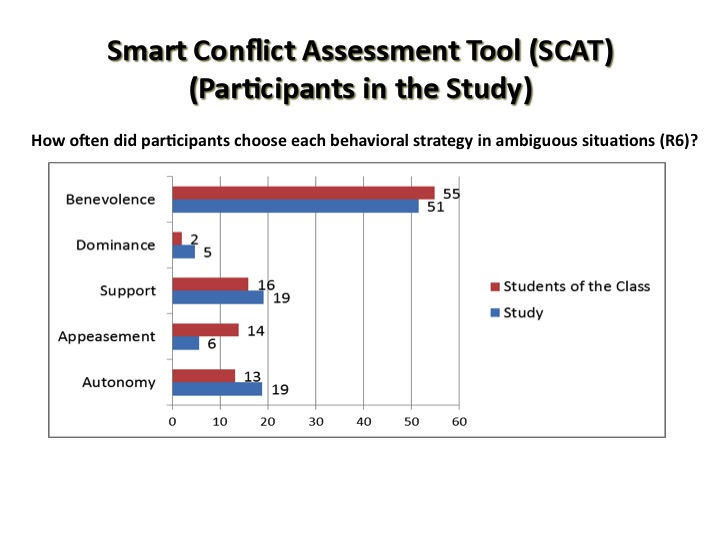Smart Conflict Assessment Tool (SCAT)
Overview
For our measure of conflict adaptivity – the Smart Conflict Assessment Tool (SCAT) – we use the conceptual framework of a situated model of conflict in social relations (Coleman et al., 2012; Coleman et al., 2010; Coleman et al., in press) and our methodological approach to assessment has similarities with the methods developed by Vroom and Yetton for assessing tendencies regarding their contingency model of leadership behavior (Vroom & Yetton, 1973; Vroom & Yago, 1978).
The goal of the measure is to assess individual differences in adaptivity of managers when dealing with conflicts at work. The SCAT asks participants to imagine themselves in 15 categorically different conflict situations (3 scenarios for each of the 5 regions of the model; see Figure 1). Then the participant is asked to indicate how he/she would respond to the situation, choosing one of 5 behavioral strategies. The behavioral strategies represent the 5 distinct behavioral responses that correspond to the 5 regions (see Figure 1): benevolence, dominance, support, appeasement, autonomy. A degree of feasibility is determined for a participant’s response to each situation. The average across all scenarios constitutes the adaptivity score.
Publications
Tracking adaptivity: Introducing a dynamic measure of adaptive conflict orientations in organizations
By Peter T. Coleman and Katharina Kugler (under review)
Since Darwin, adaptation to change has been associated with survival and fit. Yet despite this, leaders and managers often get stuck in dominating approaches to conflict, and few scholars have examined the role of adaptation in managing conflicts effectively over time and across changing situations. Four studies are presented based on a situated model of conflict in social relations, which contribute to the development of a new measure (the Smart Conflict Assessment Tool – SCAT) for assessing conflict adaptivity at work. The model suggests that more adaptive approaches to conflict – those that allow for the use of varied strategies that are in line with the demands of situations and effectively meet disputant’s needs– will result in higher levels of satisfaction with conflict and work. Results support our hypotheses. Individuals who responded to fundamentally different conflict scenarios in a manner not inconsistent with the demands of the situations they faced reported higher levels of general satisfaction with conflict processes, relationships and outcomes at work, and with greater work satisfaction. Limitations and implications of the research are discussed.
Services, tools, and resources
- Implicit Power Theory and Scale
- Organizational Power Practices Framework
